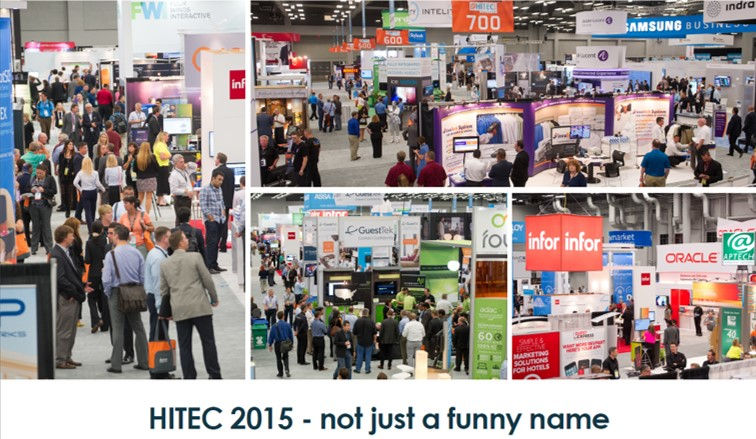HITEC 2015 - not just a funny name
- Jane Pendlebury
- May 17, 2021
- 4 min read

HOSPA CEO Carl Weldon reports from this year’s event in Austin
HITEC had an almost record attendance this year with over 6,000 attending (6,045 to be precise – second-highest ever) There were also a record number of exhibitors, with over 800 on the show floor – and 700 have already booked for next year. There was clearly a great deal of business being done with the industry clearly ready to invest in its technology again, which is great news for everyone. The potential next big things were on display in the exhibition and up for debate in the education sessions, where the main topics also included the Internet of Things, Big Data, the online travel agents, security and marketing. And, of course, with such a gathering in one city over four days there was also plenty of networking and more informal exchanging of ideas.
Security
The message from both HITEC and the HFTP Financial Executives Exchange that HOSPA Chairman Chris Upton and I attended was that PCI and data security is a serious issue. It will not go away. It is not whether you get breached it is how to react when they do break in. Sixty-six per cent of an organisation do not know that the data being hacked was actually still on their system and there is a misconception that vendors do compliance for you. Breaches create the need for data discovery and clearly identified network plans of where your data is.
You should ask: “Where is that card data in our environment?” The key message: “Reduce cardholder data footprint”.
Sixty-five per cent of breaches have organised crime behind them. Ninety-two per cent of compromises are simple, low hanging fruit and 96% could have been prevented with simple controls.
Remember - If you don't need it - don't store it – or at least render it unreadable. There is a NIST (National Institute of Standards and Technology) white paper (No NISTIR 7564) on good security metrics – and if you can prove that yours are good then this will help to reduce your cyber-security insurance costs. Using security metrics and reviewing them can in the long run change the behaviour of people. Actually preventing the malware in the first place can reduce security and IT costs.
The industry needs more professional technology management. Josh Klein, the New York-based hacker and a consultant on security told the conference that management of technology should never forget to continue to “grind out the sausage-meat of good security”.
Consider:
• Simplify the business process
• Outsourcing some or all processes
• Remove complexity wherever you can
• There is no Silver Bullet – remember that if a person can create it.. then another can break it.
PCI Security Standards Council can be found on www.Pcisecuritystandards.Org
Marketing
Marketing is using more and more technology resources. We witnessed a session of three large groups (Destinations Hotels & Resorts, Diamond Resorts and Omni Hotels & Resorts) discussing the team work between CIOs and CMOs. One group told attendees that their IT department hosted a monthly session updating the rest of the company on what was in development or about to go live, while another described how they started “a conversation about the business initiative and how the technology can support or hinder this”.
This is also reflected in job titles. One group now has a marketing director with responsibility for revenue management and social media. Another has a VP of social media. Some have changed the name of revenue management to revenue optimisation.
The online travel agents
Fifty-three per cent of online shopping now starts with Amazon and, if you think about it, Amazon is just a Big Data company that happens to sell books and music (mostly). The OTAs are similar in this respect in terms of selling hotel rooms.
Dr Michael Toedt, Managing Partner & CEO of Toedt, Dr. Selk & Coll, commented that “The ‘thing’ these companies are good at is listening. To what the customer is enquiring about and asking for.”
Hotels are just the opposite, apparently. They are bad at joinedup data – and therefore at spotting trends. This starts with our IT systems being separately compartmentalised: and so they are in need of a new design for the data we have to avoid ‘data impotence’. The hotel industry is well behind the likes of Expedia Inc, which invested almost $700m in their technology and data (plus $2.8bn on marketing) last year – and they do not even own a hotel!
We really must learn to work with them and use them to our best advantage, and, yes at a cost. The world is a changing place and one we cannot afford to ignore, particularly when Booking.com is offering free websites for small hotels.
Future planning
And so to the future. I had a few interesting conversations with CIOs and vendors on Wi-Fi. One CIO for a 1,500 room hotel in Las Vegas told me how she was planning to upgrade the network to allow for better entertainment delivery. Another discussion suggested that hotels should be allowing for up to five devices per guest when looking at their Wi-Fi networks.
This was highlighted by David Rose, CEO at Ditto Labs and author of Enchanted Objects, who told us in his final key note talking about the upcoming developments in the Internet of Things – all listed below for you to investigate at your leisure. The thing to consider here of course is – this will only add to the ‘network overhead’ that all we and our guests will carry into our hotels!
(HOSPA has a Technology Community evening on the Future of the Hotel Network to discuss just this on 22nd July – to register see http://www.hospa.org/en/events/eventsdetails/it-community-event-july/#.VYR-4kZ4nng)
Some Enchanted Things:
HAPI Fork - https://www.hapi.com/
Have a great Summer!

Comments